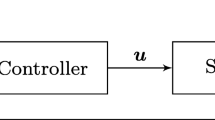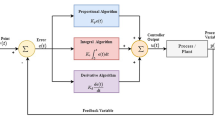Abstract
In this paper, we present an investigation on the tracking performances of feedback control as a function of reference signals. We use multi-objective optimal designs of feedback controls as a fair basis for comparing different control designs, and examine step, ramp, and periodic signals at various frequencies. Through comparing the tracking performances of controls designed with different reference signals, we find that the controls designed with ramp signals perform better in tracking step and ramp references than those designed with step signals. To track periodic signals, we find that the controls designed with periodic signals at the same frequency generally provide the best performance, and those designed with step and ramp signals perform comparably.










Similar content being viewed by others
References
Yu CC (2006) Autotuning of PID controllers, 2nd edn. Springer, London
Doyle JC, Francis BA, Tannenbaum AR (1992) Feedback control theory. Macmillan, New York
Liu GP, Whidborne JF, Duan GR (2002) Multiobjective design using various control techniques. In: Proceedings of IEEE international symposium on computer aided control system design, Glasgow, UK, pp 1–6 2002
Caramia M, Dell’Olmo P (2008) Multi-objective management in freight logistics: increasing capacity, service level and safety with optimization algorithms. Springer, London
Oliveira PBDM, Pires EJS, Cunha JB et al (2009) Multi-objective particle swarm optimization design of PID controllers. Lecture notes in computer science 5518. Springer, Germany, pp 1222–1230
Coello CAC, Lechuga MS (2002) MOPSO: a proposal for multiple objective particle swarm optimization. In: Proceedings of the 2002 congress on evolutionary computation. Honululu, USA, pp 1051–1056
Poli R, Kennedy J, Blackwell T (2007) Particle swarm optimization. Swarm Intell 1:33–57
Coello CAC, Pulido GT, Lechuga MS (2004) Handling multiple objectives with particle swarm optimization. IEEE Trans Evol Comput 8:256–279
Coello CAC, Lamont GB, Veldhuizen DAV (2002) Evolutionary algorithms for solving multi-objective problems. Kluwer, New York
Sardahi Y (2016) Multi-objective optimal design of control systems. Dissertation, University of California, Merced
Xiong FR, He MX, Naranjani Y et al (2017) Multiobjective optimization of non-uniform beam for minimum weight and sound radiation. Trans Tianjin Univ 23:380–393
Acknowledgements
This study was supported by the National Natural Science Foundation of China (Nos. 11172197, 11332008 and 11572215), and a Grant from the University of California Institute for Mexico and the United States (UC MEXUS) and the Consejo Nacional de Ciencia y Tecnología de México (CONACYT) through the project “Hybridizing Set Oriented Methods and Evolutionary Strategies to Obtain Fast and Reliable Multi-objective Optimization Algorithms”.
Author information
Authors and Affiliations
Corresponding author
Rights and permissions
About this article
Cite this article
Zhao, Q., Qin, Z. & Sun, J. Influence of Design Reference on Tracking Performance of Feedback Control. Trans. Tianjin Univ. 24, 66–72 (2018). https://doi.org/10.1007/s12209-017-0100-z
Received:
Revised:
Accepted:
Published:
Issue Date:
DOI: https://doi.org/10.1007/s12209-017-0100-z




